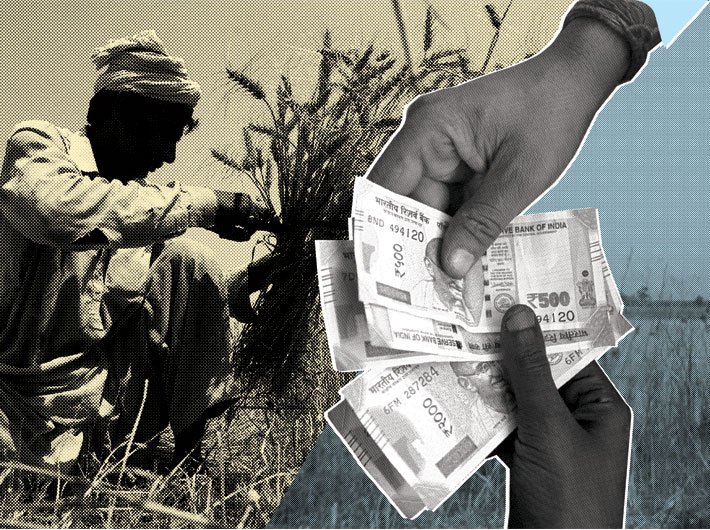As farm distress impacted assembly polls, loan waiver is the buzzword. Telangana’s pre-harvest support scheme is a better alternative
Farmers have at last forced the nation to sit up and take notice of what they are enduring. They marched to Delhi to protest. Then the assembly elections happened, and the defeat of the ruling BJP in three of its bastions – Rajasthan, Madhya Pradesh, and Chhattisgarh – is seen as a major backlash from farm distress. If there is one intervention, however, that agriculture experts say alleviated much of farmers’ misery, it was that made by the Telangana government.
The Telangana Rashtra Samiti (TRS) government launched a direct cash transfer scheme called the Rythu Bandhu Pathakam. Farmers are given Rs 4,000 per acre during the rabi and kharif seasons. This helps them take care of inputs and survive through the months of ploughing, sowing, and waiting for the crop to be ready for harvesting. It’s a scheme that global media has taken note of, besides the centre and the governments of neighbouring Andhra Pradesh and Maharashtra. It has also repaid the TRS government of chief minister K Chandrashekar Rao with an election victory while big guns like Shivraj Chouhan of Madhya Pradesh, Vasundhara Raje of Rajasthan, and Raman Singh of Chhattisgarh were defeated.
Critics of the scheme, however, say that sharecroppers – burdened most by rural distress – are left out. Since the scheme sets no limit on acreage, the biggest beneficiaries are rich farmers with enormous holdings. Telangana, though, takes credit for pioneering an income scheme for farmers through direct cash transfers to their bank accounts.
Many experts have suggested such schemes. Former finance minister Yashwant Sinha had in a recent newspaper column recommended that farmers should be given Rs 6,000 per acre per crop season. He suggested an upper limit of five acres so that the lion’s share isn’t cornered by rich and powerful farmers. The former minister estimated that if the centre and the states share the cost 70:30, it would cost the centre '1.29 lakh crore, less than one percent of the GDP. Economist Arvind Subramaniam, a former adviser to the finance ministry, had praised the Telangana scheme and recommended its replication across the country.
Post-harvest interventions haven’t been as effective, especially when prices crash owing to glut. What happened, for instance, in neighbouring Andhra Pradesh, was that instead of hitting the usual '16 per kilo or so for farmers, prices plunged from previous years to Rs 2 per kilo. The government stepped in post harvest to ensure they got at least '5 per kilo by reimbursing them their input costs. Besides, they were to get Rs 2,000 per tonne of mango, provided they sold it to government-listed processing companies. Outsiders were not welcome. But the listed companies were soon glutted with far more than their production cycles could handle. So the companies kept farmers who turned up late waiting outside for days till they dumped their harvest and left. Farmers ended up losing money as rent accumulated on the tractor-trolleys they had hired for transporting the crop.
Chennaiah, a farmer from Chittoor district and activist of the National Alliance of People’s Movements, says 70 percent of farmers ended up paying through their nose for hiring the tractors and the compensation was of little help. Chennaiah was lucky: he sold 10 tonnes for Rs 6,000 a tonne and is expecting Rs 20,000 more from the government. “I didn’t have to hire a tractor so I could cut my losses. If prices fall again next year, farmers will have to fell their mango trees,” he says. Another farmer, Vijay, from Pileru in Chittoor district, says the government should have let companies from across the country to purchase mangoes from Andhra farmers.
Last year, a Telangana tur dal procurement experiment proved disastrous for all but middlemen and traders. Farmers usually sell tur in December, and the price in that month was low. But procurement opened in January and the middlemen and big traders who had bought up all the tur from farmers sold it to the government making an easy killing. Karnataka’s tur and ragi procurement plan, however, has benefited farmers.
In Madhya Pradesh, a price deficiency payment scheme – the Bhavantar scheme – was initiated, in which farmers were assured of compensation for the difference between support price and market price. This too was cornered by middlemen and big traders, partly because only 30 percent of farmers registered for the scheme. And the middlemen and traders squeezed the government by pushing prices upwards or downwards to their benefit.
The latest interventions from governments in Madhya Pradesh and Chhattisgarh – the new Congress governments, that is – are loan waivers. “But these are temporary solutions, and farmers stop repaying loans expecting waivers as elections approach,” says Jaganmohan Reddy, a farmer-activist from the NGO APMAS.
The Economist magazine was critical of such interventions and noted that “since 2014, no fewer than eight states have waived a total of well over $25bn [Rs 1.75 trillion] in farmers’ debts.” It praised Telangana’s Rythu Bandhu scheme, saying this should be the way forward. Agriculture economist Devinder Sharma says in his blog ‘Ground Reality’: “Farmers have so far been subsidising the consumers by keeping food prices low. What is needed is a fixed monthly income for every farmer taking into account his basic expenses.” Telangana’s beginning is a small fraction of what Sharma recommends, but it marks a new beginning.
feedback@governancenow.com

